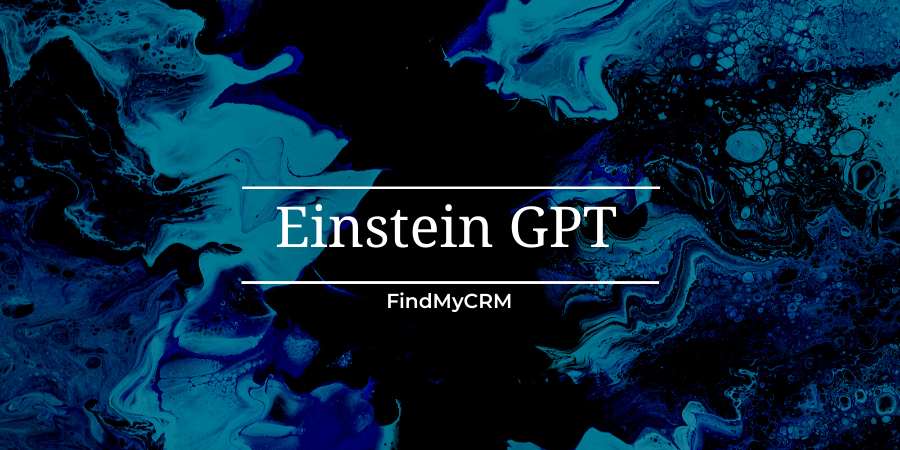Customer Relationship Management (CRM) has long been a critical component of successful business strategies. It involves managing interactions with existing and potential customers to enhance customer satisfaction and foster long-term loyalty. As technology advances, businesses seek innovative ways to improve their CRM efforts and streamline customer interactions.
One revolutionary development in the CRM landscape is the introduction of Einstein GPT, the world's first generative AI for CRM. In this article, we will explore the capabilities and potential of Einstein GPT, how it differs from traditional CRM systems, and the impact it can have on businesses.

Understanding Einstein GPT
What is Generative AI?
Generative Artificial Intelligence (AI) is a branch of AI that focuses on creating models capable of generating new content or data. Unlike traditional AI systems that operate based on predefined rules or patterns, generative AI can produce original and creative outputs, such as text, images, music, and more. It has proven to be a game-changer in various industries, from art and entertainment to healthcare and finance.
The Brain behind Einstein GPT
Einstein GPT is built upon the foundation of the renowned GPT-3.5 architecture developed by OpenAI. GPT-3.5 is a language model that employs deep learning techniques, particularly transformer-based neural networks. It is trained on massive amounts of data, including text from books, articles, websites, and various other sources. This extensive training allows Einstein GPT to understand and generate human-like text with remarkable coherence and accuracy.

Tailoring GPT for CRM
The adaptation of GPT-3.5 to CRM applications marks a significant breakthrough. While the original model demonstrates impressive language generation capabilities, customizing it for CRM demands specialized training and fine-tuning. The integration of CRM data and domain-specific knowledge refines Einstein GPT, enabling it to comprehend and respond to customer queries and requests with domain-specific expertise.
[Related Article: ChatSpot.ai: A revolution in conversational AI]

Einstein GPT in Action
Personalized Customer Interactions
One of the most significant advantages of Einstein GPT is its ability to deliver highly personalized customer interactions. Traditional CRM systems often rely on predefined templates or scripts for customer engagement. However, Einstein GPT takes personalization to the next level by generating bespoke responses tailored to individual customer needs. Whether it's answering product inquiries, addressing concerns, or suggesting relevant offers, Einstein GPT ensures that each customer feels valued and attended to.
Automating Customer Support
Customer support is a critical aspect of CRM, but it can also be resource-intensive and time-consuming. Einstein GPT streamlines the customer support process by automating responses to common queries. Through its language generation capabilities, the AI can efficiently address routine issues, allowing human agents to focus on more complex and nuanced customer concerns. This not only improves efficiency but also enhances the overall customer experience.
Proactive Customer Engagement
Beyond responding to customer queries, Einstein GPT can proactively engage with customers based on their preferences and behaviors. By analyzing past interactions and transaction history, the AI can generate personalized recommendations, offers, and updates that resonate with each customer. This proactive engagement strengthens customer loyalty and drives repeat business, leading to increased sales and revenue for businesses.
Sentiment Analysis and Customer Insights
In addition to personalized interactions, Einstein GPT can perform sentiment analysis on customer interactions. It can gauge the emotions and feelings expressed by customers in their communications, providing businesses with valuable insights into customer satisfaction levels and pain points. This sentiment analysis data can be used to identify areas for improvement in products, services, or customer support processes, ultimately leading to better customer experiences.
[Related Article: The 15 top AI tools for your business]

Advantages of Einstein GPT for CRM
Enhanced Customer Experience
The primary goal of CRM is to deliver exceptional customer experiences. With Einstein GPT, businesses can elevate their customer interactions to new heights. The AI's natural language generation enables more human-like conversations, making customers feel understood and appreciated. This heightened sense of personalization fosters stronger connections between customers and brands, fostering long-term loyalty.
Scalability and Efficiency
Traditional customer support often faces limitations in scalability, particularly during peak periods when an influx of customer inquiries can overwhelm support teams. Einstein GPT addresses this challenge by providing scalable and efficient customer support. The AI can handle a large volume of inquiries simultaneously, ensuring that customers receive prompt and accurate responses, regardless of the load.
Data-Driven Insights
Einstein GPT's interactions with customers generate valuable data that can be harnessed for business insights. The AI can analyze trends, preferences, and pain points, offering businesses a deeper understanding of their customer base. These data-driven insights empower businesses to make informed decisions, optimize marketing strategies, and identify opportunities for growth.
Increased Sales and Revenue
By providing personalized and proactive customer engagement, Einstein GPT contributes to increased sales and revenue for businesses. The AI's ability to suggest relevant offers and recommendations to customers boosts the likelihood of successful upselling and cross-selling. Moreover, the enhanced customer experience and loyalty cultivated by Einstein GPT lead to higher customer retention rates, reducing customer churn and further contributing to revenue growth.

Challenges and Limitations
Bias and Ethical Concerns
As with any AI system, bias can be a significant concern. Einstein GPT relies on the data it has been trained on, which may inadvertently include biases present in the source data. This can lead to biased responses or perpetuation of stereotypes in customer interactions. Businesses must be vigilant in monitoring and mitigating bias to ensure fair and ethical AI-powered CRM.
Complexity of Training
Implementing Einstein GPT requires significant resources and expertise. Training the AI on domain-specific CRM data and fine-tuning it for optimal performance can be a complex and time-consuming process. Businesses need to invest in skilled AI engineers and data scientists to effectively deploy and maintain the AI system.
Security and Privacy Concerns
As Einstein GPT interacts with customers and stores their data, security and privacy concerns must be addressed diligently. Businesses must implement robust security measures to safeguard customer information and prevent potential data breaches. Compliance with relevant data protection regulations, such as GDPR and CCPA, is essential to maintaining customer trust and ensuring legal compliance.
Dependency on Data Quality
The performance of Einstein GPT is highly dependent on the quality and diversity of the data it is trained on. If the training data is incomplete, inaccurate, or biased, it may lead to suboptimal performance and unreliable outputs. Therefore, businesses must invest in data cleaning and validation processes to ensure the AI receives accurate and reliable training data.
[Related Article: The Role of Artificial Intelligence in CRM]

The Future of CRM with Einstein GPT
Einstein GPT represents a significant advancement in the field of CRM and AI-powered customer interactions. As technology continues to evolve, the potential of Einstein GPT is likely to expand further. Future developments may include real-time language translation capabilities, enabling seamless interactions with customers from diverse linguistic backgrounds.
Moreover, integration with other AI technologies, such as computer vision, may enhance Einstein GPT's ability to process multimedia data, opening doors to interactive and visually-rich customer experiences. The combination of AI technologies could lead to comprehensive AI-powered CRM solutions that provide businesses with a holistic view of their customers and enable them to deliver even more personalized and meaningful interactions.
Conclusion
Einstein GPT represents a groundbreaking advancement in the field of CRM. By leveraging the power of generative AI, businesses can transform their customer interactions, deliver unparalleled personalization, and achieve higher levels of customer satisfaction and loyalty. However, while Einstein GPT holds immense potential, businesses must be mindful of ethical considerations and invest in appropriate training and expertise to fully harness the power of this revolutionary AI for CRM.
As technology continues to evolve, Einstein GPT is likely just the beginning of a new era of AI-driven customer relationship management. The ability of AI to generate human-like text and comprehend customer queries in real-time opens up countless possibilities for businesses to excel in customer engagement. The key lies in embracing AI responsibly, addressing its limitations, and continuously innovating to create better customer experiences and lasting relationships. With Einstein GPT leading the way, the future of CRM is filled with endless opportunities for businesses to thrive in an increasingly AI-driven world.





